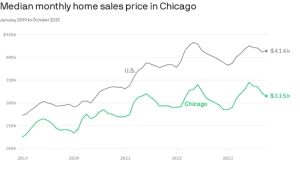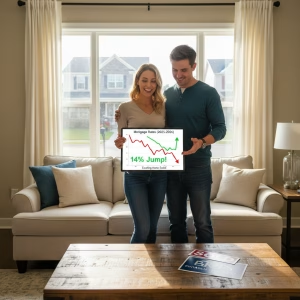Selling your home in today’s shifting real estate market can feel like trying to hit a moving target. Between rising interest rates, fluctuating buyer demand, and changes in local inventory, pricing your home correctly is more critical than ever.
In a market like Chicago—where conditions can change quickly—setting the right price from the start can mean the difference between a fast sale and months of sitting on the market.
Here are 6 strategies to help you price your home with confidence in a changing market:
1. Know the Type of Market You’re In
Are you in a buyer’s market, seller’s market, or a neutral market?
-
Seller’s Market: High demand, low inventory. Homes sell quickly—often for over asking price.
-
Buyer’s Market: More supply than demand. Pricing needs to be competitive.
-
Neutral Market: Balanced supply and demand. Homes are priced fairly based on recent data.

(source: Axios)
Pro Tip: Neighborhood trends vary. What’s happening in Lincoln Park might not reflect what’s happening in South Shore.
2. Use Comparable Sales to Set the Baseline
A Comparative Market Analysis (CMA) is the gold standard when it comes to pricing. Your agent will analyze:
-
Recently sold homes in your area
-
Homes with similar square footage, bed/bath count, and condition
-
Sale prices from the past 3–6 months

3. Consider Market Momentum
Beyond the comps, pay attention to how fast homes are selling and how competitive the market feels.
-
Are homes sitting on the market longer?
-
Are you seeing bidding wars in your neighborhood?
In a transitional market, slightly underpricing your home can attract more interest—and even spark a bidding war.

4. Factor in Your Home’s Condition
Buyers are drawn to homes that are clean, staged, and move-in ready.
-
Have you updated kitchens or bathrooms?
-
Is your home free of major repairs?
-
Does it photograph well?

Homes that feel turnkey often sell faster and closer to asking price—even in slower markets.
5. Don’t Let Emotions Set the Price
It’s common to feel emotionally attached to your home—but pricing should always be based on market data, not feelings.
Your home’s value is what a buyer is willing to pay—not what you hope to make.

6. Work With a Real Estate Professional
A local real estate expert will:
-
Provide a professional CMA
-
Guide your pricing strategy with real-time market data
-
Advise on improvements that can increase your home’s value
-
Help you adapt as the market shifts






